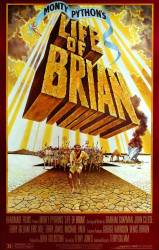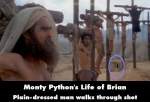Factual error: There were no gourds in Ancient Judea, of that type. The 'gourd' mentioned in the Bible refers to a colocynth plant, which yields only a small fruit, 5 - 10cm diameter. The gourd in the film is from a pumpkin, and not from a watermelon, as others have suggested. Pumpkins originated in the Americas, and there weren't any in the rest of the world before Columbus.
Suggested correction: This is a movie where Brian falls inside a flying UFO with alien pilots. I seriously doubt that the filmmakers had any intention whatsoever to be historically accurate.
Regardless of the random UFO scene, this is still a factual mistake. It doesn't matter if a film maker sets out to intentionally make a historically accurate film or not. There's nothing to suggest this film was set in an alternate past or that it was a sight gag as if it was a Mel Brook's film.






